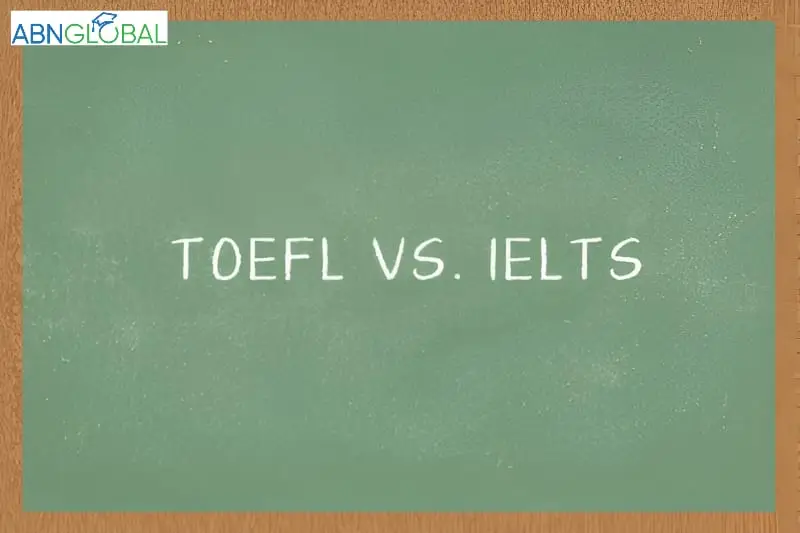
Posted on: 24 Dec
IELTS Vs TOEFL
IELTS vs TOEFL: Which Is Better For Studying In The UK?
IELTS and TOEFL are the two most widely accepted English language tests worldwide, including by universities in the United Kingdom. The subtleties of each test play a major role in guiding students abroad. If one is applying to a university in the UK or anywhere else in the world, the decision to opt for one or the other test can actually influence chances of admission or success thereafter.
Both tests are for testing the proficiency of non-native speakers in the English language. However, there may be factors that can influence which one to take, like how comfortable a student is with different test formats and specific requirements from a chosen university in the UK. As a study abroad consultant, being able to clearly and concisely compare these exams can help students make the best decision.

Understanding IELTS
The IELTS has four main modules: Listening, Reading, Writing, and Speaking. This test has gained wider acceptance from institutions in the UK because it is preferred in this respect due to its applied and straightforward approach to English proficiency testing. It places much greater emphasis on more 'hands-on' use and realistic application of English that can be very appealing to students who want to go for studies in the UK.
IELTS scores range from 1 to 9 and clearly indicate the user's proficiency level. This transparent score also helps UK universities clearly define the precise entry requirements for them. As overseas consultants, guiding students as to how to relate their scores to their respective educational objectives and expectations of the desired university becomes extremely important.
Understanding TOEFL
However, the Test of English as a Foreign Language is more frequently taken as an internet-based test (iBT) and includes Reading, Listening, Speaking, and Writing sections. Although most UK universities accept TOEFL, it is commonly favored by American universities. The test is supposed to measure academic English proficiency and largely depends on the use of language in an academic environment.
The scores range from 0 to 120 points. The test section is up to 30 points. This is an extremely detailed scoring system type that will assist institutions in the evaluation of specific competencies in the English language. It is important to know the scoring and the strategic approach in tackling the TOEFL, especially if the students are advised by study abroad consultants and have a preference for certain universities that might favor this test over IELTS.
Comparative Analysis
The most significant difference between the two is that IELTS is offered in paper-based and computer-delivered tests. This may give an edge to students who are accustomed to the traditional method of testing. On the other hand, TOEFL is internet-based, which requires a small amount of comfort with digital platforms, an important factor for a study abroad consultant working with students of different technological competencies.
The other difference is the academic content of the test. IELTS tends to take a more general approach through tests checking on every day, day-to-day application of general English language skills. It is therefore perfect for anyone who intends to study in the UK. TOEFL takes an academic approach sincethe tasks given are usually similar to those used in university lectures and seminars. In a nutshell, this makes it crucial that the study abroad consultants evaluate the student's academic background in selecting the appropriate test to advise.
Pros and Cons
The most significant advantage of IELTS for student applicants who want to stay in the UK is that the British have widespread acceptance and a focus on the communicative use of the language, reflecting British living and academic conditions. However, some students may find it hard to handle the wider variety of accents and the faster speech of people in the listening component.
TOEFL has the advantage of comprehensively testing academic English, a feature that would be ideal for students aiming at the most competitive courses. Its format may deter those not used to computer-based tests or who like to engage more directly with others because the speaking test is conducted through recorded responses, not through talking to an examiner.
Decision Factors
In study abroad consultants, guiding the student in choosing between IELTS and TOEFL depends upon the requirements for courses to be undertaken in that specific university. Universities may favor one over the other for courses and profiles of students being selected from different nations. Moreover, where the student feels comfortable or relaxed would have a large influence on the outcome because a test that he finds unfamiliar would hamper his chances.
Another very important aspect of the tests is their geographical availability. In some countries, TOEFL is more accessible than IELTS, and vice versa. As a study abroad consultant, it becomes very important to give information on test centers, dates of availability, and preparation resources for the tests to help students who wish to study in the UK make an informed decision that suits their academic and logistic needs.
Conclusion
To put it into final words, both IELTS and TOEFL have already proven to be effective evaluation techniques for the language proficiency of those who would like to study in the UK. As a study abroad consultant, it is, therefore, of utmost importance to assess every situation of each student, their mode of learning, test-taking styles, academic goals, among others, and most importantly, the specific requirements of the universities they target. In doing so, consultants can endow students with the right information and confidence to excel in their selected tests and continue with their further educational journey.
Users Feedback
People’s Comments
Have Thoughts